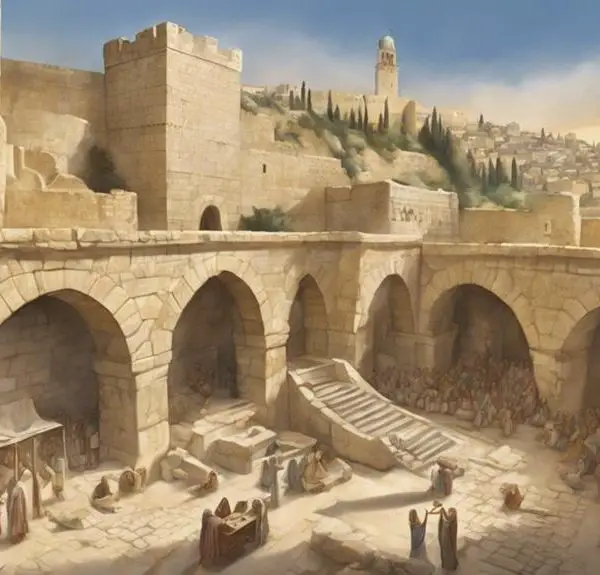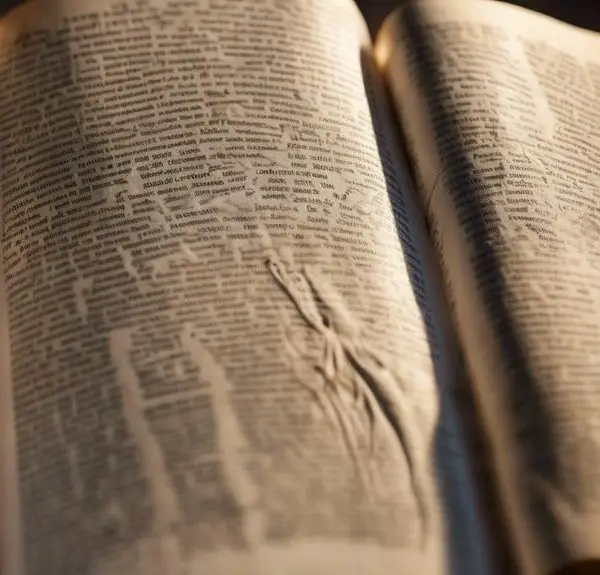A biblical figure, Jubal, emerges as the first musician, intriguingly linking ancient strings and pipes to our musical heritage—discover his lasting influence.

Who Was the First Musician in the Bible
Interestingly, as you're exploring the origins of music, you'll find that the Bible mentions its very first musician, Jubal. He's not just a footnote in history; he's recognized as 'the father of all who play stringed instruments and pipes.'
You might wonder how Jubal's legacy influences modern music and what instruments he played that still resonate today. While the details of his life and achievements are sparse, the impact of this biblical figure on music's divine connection and cultural significance through the ages is undeniable.
This journey into the past offers a unique lens through which to view the evolution of musical expression.
Key Takeaways
- Jubal is identified as the first musician in biblical texts, introducing stringed instruments and pipes.
- His teachings were foundational to the development and expression of ancient music.
- Music, since its inception by Jubal, has served as a bridge between the spiritual realm and human experience.
- Through Jubal's legacy, music became integral to cultural, religious, and social practices in ancient societies.
The Genesis of Music

In exploring the genesis of music within biblical texts, it's essential to consider the cultural and historical context that shaped its early development. The musical origins within these sacred scripts aren't merely anecdotal but deeply interwoven with the fabric of ancient societal structures and religious practices. These early mentions of music, or biblical harmonies, serve as a testament to the integral role that music played in the expression of faith, community, and identity among the peoples of the ancient Near East.
The analysis of these texts reveals that music's role transcended entertainment. It was pivotal in rituals, ceremonies, and even in everyday life, signifying a profound connection between the divine and the mortal. This connection was mediated through various instruments and compositions, which were believed to bridge the human experience with celestial realms. Hence, the study of biblical harmonies isn't just an exploration of musicality but an insight into the spiritual and sociocultural dynamics of ancient civilizations.
Understanding these musical origins requires a nuanced appreciation of the texts and the contexts in which they were written. It's a journey into how early communities perceived and harnessed the power of music to communicate, commemorate, and connect with the divine.
Jubal's Musical Legacy

Jubal, often recognized as the father of music within the biblical narrative, played a pivotal role in shaping the early musical traditions by introducing stringed instruments and pipes. His contributions not only marked the inception of music but also established a legacy that would be inherited by Jubal's descendants. These early musicians, guided by Jubal's innovative spirit, continued to refine and expand upon the musical concepts he introduced, ensuring that his influence would resonate through generations.
The ancient melodies that emerged from Jubal's teachings became foundational to the musical expressions of the time. As the first to harness the emotive power of music, Jubal's impact on the cultural and religious practices of his descendants was profound. These melodies, though now lost to history, likely served a variety of functions, from ceremonial to communal bonding, illustrating the multifaceted role of music in ancient society.
Jubal's descendants, as custodians of his musical innovations, played a critical role in preserving and transmitting these ancient melodies. Their dedication to upholding Jubal's legacy ensured that his contributions to music weren't forgotten but instead became a cornerstone of their cultural heritage.
Instruments of the Time

Building on Jubal's foundational work, the instruments of his time were pivotal in shaping the sonic landscapes of ancient musical practices. You'll find that the evolution of craftsmanship and the understanding of ancient tuning principles played a significant role in the development of these early musical tools. This period marked a critical juncture in the history of music, where the design and construction of instruments were as much about innovation as they were about tradition.
Craftsmanship evolution during this era wasn't merely about aesthetic appeal but also about enhancing the acoustic properties of instruments. Artisans experimented with various materials and shapes to improve sound quality, resonance, and durability. The meticulous crafting process ensured that each instrument could produce a distinct sound, contributing to the rich tapestry of ancient music.
Moreover, ancient tuning techniques were crucial in the creation of harmonious and melodious sounds. Understanding the physics of sound, musicians of the time developed systems for tuning their instruments, allowing for the performance of more complex and sophisticated musical pieces. This early exploration into the science of sound laid the groundwork for future musical theory and practice, highlighting the ingenuity of ancient musicians.
Music's Divine Connection

Music's divine connection throughout history illustrates how melodies and rhythms transcend mere entertainment, serving as a bridge between the spiritual realm and human experience. This profound link between music and the divine is evident in various traditions, where musical worship plays a central role in connecting believers with a higher power. Divine melodies aren't just a form of expression but a medium through which spiritual communication takes place.
To understand this connection further, consider the following:
- Musical Worship as a Form of Prayer: Many religions utilize music as a direct form of communication with the divine, where songs serve as prayers that express devotion, gratitude, or the seeking of guidance.
- Divine Inspiration in Composition: Composers throughout history have often attributed their works to divine inspiration, suggesting that the music they create isn't entirely of their doing, but rather through a higher power working through them.
- Music in Sacred Rituals: From ancient ceremonies to modern-day worship services, music is a key component in rituals, enhancing the spiritual experience and facilitating a deeper connection with the divine.
Analyzing these aspects reveals how musical worship and divine melodies aren't mere aspects of religious practice but are integral to the spiritual experience, serving as a universal language that bridges the human with the divine.
Cultural Impact Today

Exploring the cultural impact of music today reveals how its divine roots continue to influence various aspects of contemporary society, from art and entertainment to personal and communal expressions of faith. The omnipresence of music, underscored by global influences, bridges cultures, fostering a unique blend of traditional and contemporary sounds. Modern adaptations of ancient musical expressions aren't merely a testament to music's enduring appeal but also highlight its role in the ongoing dialogue between the past and the present.
The integration of music into religious practices illustrates its profound impact on communal faith expressions. Hymns and spiritual songs, drawing from biblical references, continue to serve as conduits for spiritual connection and worship, echoing the sacred beginnings of music as depicted in biblical narratives. Moreover, the infusion of global influences into religious music underscores the dynamic nature of faith, which adapts and evolves in response to contemporary cultural contexts.
In the realm of art and entertainment, music's biblical origins have inspired countless works, from classical compositions to modern musicals, reflecting its deep-seated influence on creative expression. This blending of ancient inspiration with modern adaptations showcases music's unparalleled capacity to transcend time, connecting generations through a shared auditory experience.
Frequently Asked Questions
How Has the Interpretation of the First Musician's Identity Evolved Over Different Bible Translations and Scholarly Works?
You've likely noticed how translation methodologies and scholarly debates have shaped the interpretation of pivotal figures across different Bible translations.
Over time, these practices have evolved, deeply influencing the perceived identities of biblical characters.
Specifically, when examining the identity of an early musician, the nuances in translations and scholarly discussions have significantly altered our understanding.
This evolution reflects broader trends in biblical scholarship, highlighting how interpretations can shift with changing academic perspectives.
Were There Any Specific Musical Theories or Scales That Can Be Traced Back to the Era of the First Musician Mentioned in the Bible?
You're exploring if there are any musical theories or scales that date back to the era of the earliest musicians.
While specific musical notation from that time hasn't survived, researchers have pieced together how instrument materials influenced sound.
It's believed that early musical scales were simpler, possibly pentatonic, shaped by the materials and construction of ancient instruments.
This understanding offers a glimpse into the musical foundations that would shape future compositions and theories.
How Did the Role and Perception of Musicians in Biblical Times Compare to That of Musicians in Other Ancient Civilizations?
In comparing the role of musicians in biblical times to those in other ancient civilizations, you'll find they were central to religious ceremonies and had significant cultural impacts.
While biblical musicians often served a spiritual purpose, enhancing worship and conveying divine messages, musicians in civilizations like Ancient Egypt or Greece also held high status, performing in religious rituals and royal courts, demonstrating the universal value and influence of music across cultures.
Are There Any Lost Musical Instruments or Sounds From Biblical Times That Researchers Are Trying to Reconstruct Today?
Yes, researchers in instrument restoration and sound archaeology are avidly working to recreate lost musical instruments and sounds from biblical times.
They delve into ancient texts and archaeological findings to uncover clues about these instruments' designs and tones.
This quest not only enriches our understanding of historical musicology but also revives ancient sounds that have been silent for millennia, offering a unique auditory glimpse into the past.
How Have Contemporary Musicians or Composers Been Inspired by or Incorporated the Story of the First Musician in the Bible Into Their Works?
You'll find that contemporary musicians and composers have creatively woven Biblical references into their works, drawing inspiration from ancient stories. These modern adaptations often blend traditional motifs with innovative musical techniques, illustrating a rich dialog between past and present.
Conclusion
In conclusion, Jubal stands as the seminal figure in the biblical narrative of music, embodying the genesis of musical expression. His legacy, as depicted, not only highlights the innovation of instruments but also underscores music's profound divine connection and its enduring cultural impact.
Through an analytical lens, it's clear that Jubal's contributions aren't merely historical footnotes but pivotal in understanding music's integral role in both ancient societies and its continuous influence in contemporary contexts.



Sign up